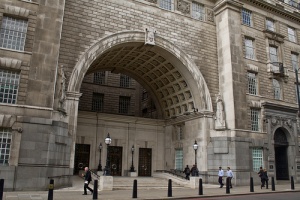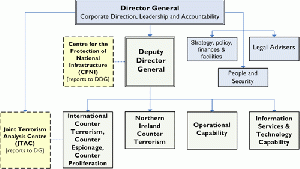Difference between revisions of "Security Service"
Tom Griffin (talk | contribs) (→Defunct Branches) |
Tom Griffin (talk | contribs) (→Defunct Branches) |
||
| Line 64: | Line 64: | ||
====Defunct Branches==== | ====Defunct Branches==== | ||
| + | *[[MI5 C Branch|C Branch]] - Protective security | ||
| + | *[[MI5 E Branch|E Branch]] - Empire and Commonwealth counter-subversion - 1953-1971 | ||
*[[MI5 F Branch|F Branch]] - counter-subversion | *[[MI5 F Branch|F Branch]] - counter-subversion | ||
*[[MI5 K Branch|K Branch]] - counterespionage 1968-1994 | *[[MI5 K Branch|K Branch]] - counterespionage 1968-1994 | ||
Revision as of 20:23, 25 November 2009
Better known as MI5, the main British domestic intelligence service.
See also: Category:MI5
Contents
Structure
Senior Management
Mark Hollingsworth and Nick Fielding give the following list of senior officers
- Director General (DG)
- Deputy Director General (DDG)
- Director and Co-ordinator of Intelligence (Northern Ireland)
- Legal Advisor to the Security Service[1]
Management Board
According to the MI5 website, the Director General, Deputy Director General and Legal Advisor make up the Management Board of the Service, along with seven branch Directors. The board is supplemented by two Non-Executive Directors from outside the Service in an advisory role.[2]
Branches
The following list is taken from the 2003 edition of Hollingsworth and Fielding's Defending the Realm: Inside MI5 and the War on Terrorism and may now be somewhat dated.[3] This is supplemented with branch descriptions from the MI5 website in italics where these seem to match Hollingsworth and Fielding's account.[4]
There are some differences between the two accounts. According to the website, international counter-terrorism and counter-espionage are the the responsibility of a single branch, suggesting that Hollingsworth and Fielding's D and G branches may have been merged or re-organised. The website also lists a separate Information Services and Technology Capability branch, suggesting that information technology may have been separated from H Branch.
- A Branch - Operational Support (Operational Capability)
- A1A: Technical Operations, such as covert entry and audio and video surveillance.
- A1F: As above, but on longer term target sites.
- A2A: intercept transcription.
- A3 and A5: Technical support for operations, including specialised covert photography and lockpickers.
- B Branch - Human Resources (People and Security)
- B1: Protective security for MI5 including building security and staff vetting.
- B2: Personnel.
- B7: Training and recruitment.
- D Branch - Non Terrorist Organisations
- D1: Vetting of non-MI5 personnel.
- D4: Counter-espionage. Targets include Russia and China.
- D5: D Branch agent runners.
- G Branch - International Terrorism (International Counter Terrorism, Counter Espionage, Counter Proliferation)
- G2P: Counter-proliferation
- G3A: C-ordination of threat assessments.
- G3C: Countering threats from South Asia, e.g. Sikh militants.
- G3W: International terrorist threats not covered by other sections.
- G6: G Branch agent runners.
- G9A: Libya, Iraq, Palestinian and Kurdish groups.
- G9B: Iranian state and Iranian dissident groups.
- G9C: Islamic extremists.
- H Branch - Corporate Affairs (strategy, policy, finance and facilities)
- H1 and H2: Liason with Whitehall, the police and the media, covert financial enquiries, management policy including information technology.
- H4: Finance.
- R2: Main Registry
- R5: Restricted 'Y-boxed' files.
- R10: Registry for temporary files.
- R20: Administers GCHQ material.
- T Branch - Irish Terrorism (Northern Ireland Counter Terrorism)
- T2A: Republican and loyalist terrorism in Great Britain.
- T2B: Liaison with local Special Branches and agent runners responsible for investigating Irish terrorism in Great Britain.
- T2C: Threat assessment for Irish terrorist groups.
- T2D: Researches Irish terrorist groups.
- T2E: Liaises with Metropolitan Police Special Branch, based at Scotland Yard.
- T5B: Investigates arms trafficking
- T5C: Counters Irish terrorism in Continental Europe, including the Republic of Ireland.
- T5D: Irish terrorism in the rest of the world.
- T5E: Studies terrorist logistics
- T8: T Branch agent-runners, includes a Northern Ireland-based section.[5]
Defunct Branches
- C Branch - Protective security
- E Branch - Empire and Commonwealth counter-subversion - 1953-1971
- F Branch - counter-subversion
- K Branch - counterespionage 1968-1994
Related organisations
People
Directors General
- Major-General Sir Vernon Kell - 1909-1940
- Brigadier Oswald Allen Harker - 1940-1941
- Sir David Petrie - 1941-1946
- Sir Percy Sillitoe - 1946-1953
- Sir Dick White - 1953-1956
- Sir Roger Hollis - 1956-1965
- Sir Martin Furnival Jones - 1965-1972
- Sir Michael Hanley - 1972-1978
- Sir Howard Smith - 1978-1981
- Sir John Jones - 1981-1985
- Sir Antony Duff - 1985-1987
- Sir Patrick Walker - 1987-1992
- Dame Stella Rimington - 1992-1996
- Sir Stephen Lander - 1996-2002
- Dame Eliza Manningham-Buller - 2002-2007 [6]
- Jonathan Evans[7]
Notes
- ↑ Mark Hollingsworth and Nick Fielding, Defending the Realm: Inside MI5 and The War on Terrorism, André Deutsch, 2003, pp.320-321.
- ↑ Organisation, MI5, accessed 19 July 2009.
- ↑ Mark Hollingsworth and Nick Fielding, Defending the Realm: Inside MI5 and The War on Terrorism, André Deutsch, 2003, pp.320-321.
- ↑ Organisation, MI5, accessed 19 July 2009.
- ↑ Mark Hollingsworth and Nick Fielding, Defending the Realm: Inside MI5 and The War on Terrorism, André Deutsch, 2003, pp.320-321.
- ↑ MI5 - Former Directors General, accessed 26 February 2008.
- ↑ MI5 - Director General, accessed 26 February 2008.

